CNA256: Essay on the Significance of Recovery Principles in MHC
VerifiedAdded on 2022/08/29
|8
|2033
|31
Essay
AI Summary
This essay delves into the crucial role of Recovery Principles (RP) in providing care for individuals facing mental health problems. It begins by exploring the historical context of mental health issues and their impact on individuals' recovery journeys. The essay emphasizes the importance of the 'Recovery' approach in Mental Health Care (MHC), focusing on how RP empowers individuals to take control of their treatment and build resilience. It highlights key recovery principles such as individuality, real choices, rights and attitudes, respect and dignity, and the CHIME framework (connectedness, hope, identity, meaning, empowerment). Furthermore, the essay discusses the application of various recovery models, including occupational and strength-based approaches, in MHC to promote social inclusion and meaningful lives for those with mental health challenges. The essay concludes by emphasizing the benefits of RP-based MHC for addressing mental health conditions and promoting overall well-being in the modern world.
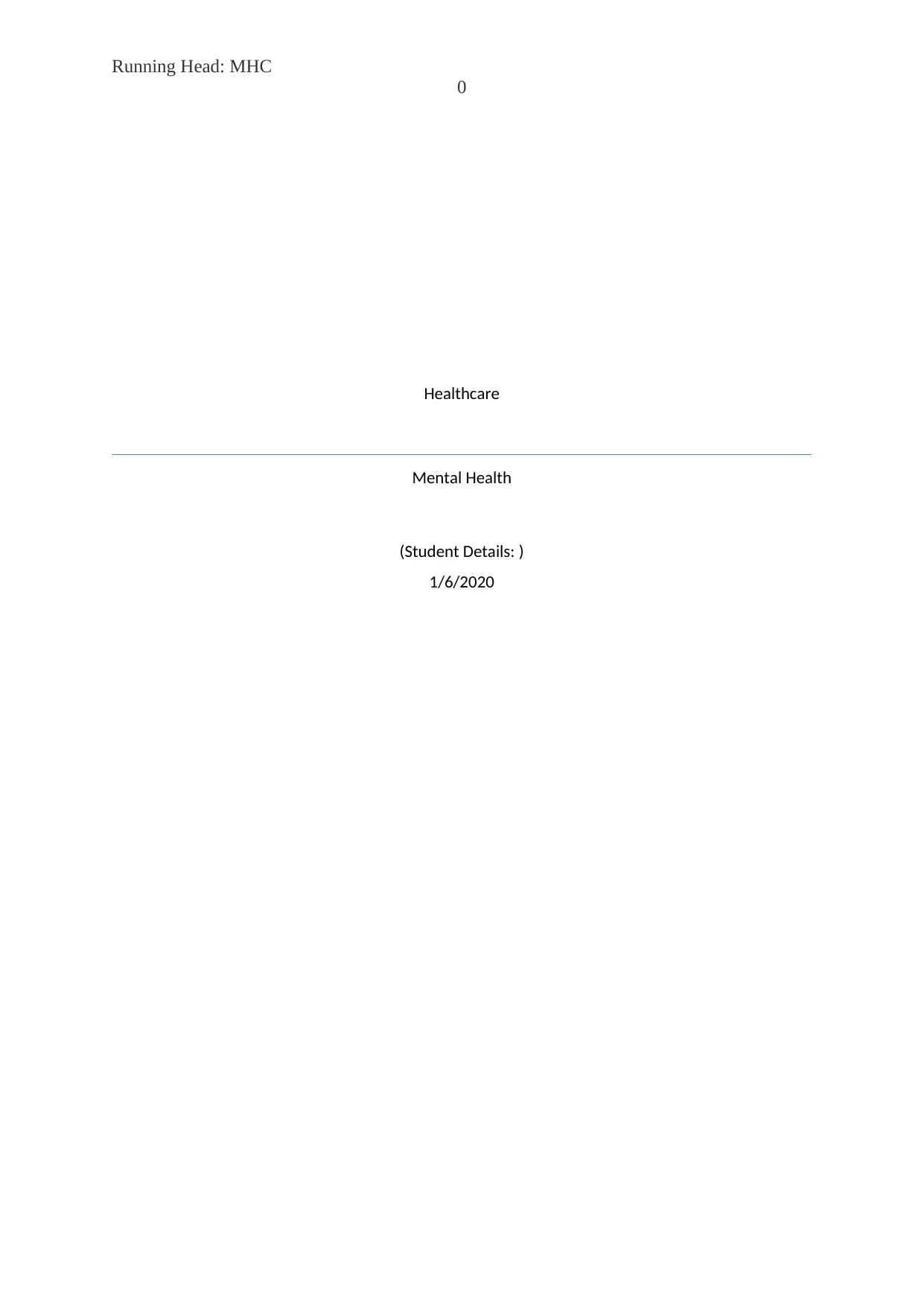
Running Head: MHC
0
Healthcare
Mental Health
(Student Details: )
1/6/2020
0
Healthcare
Mental Health
(Student Details: )
1/6/2020
Paraphrase This Document
Need a fresh take? Get an instant paraphrase of this document with our AI Paraphraser
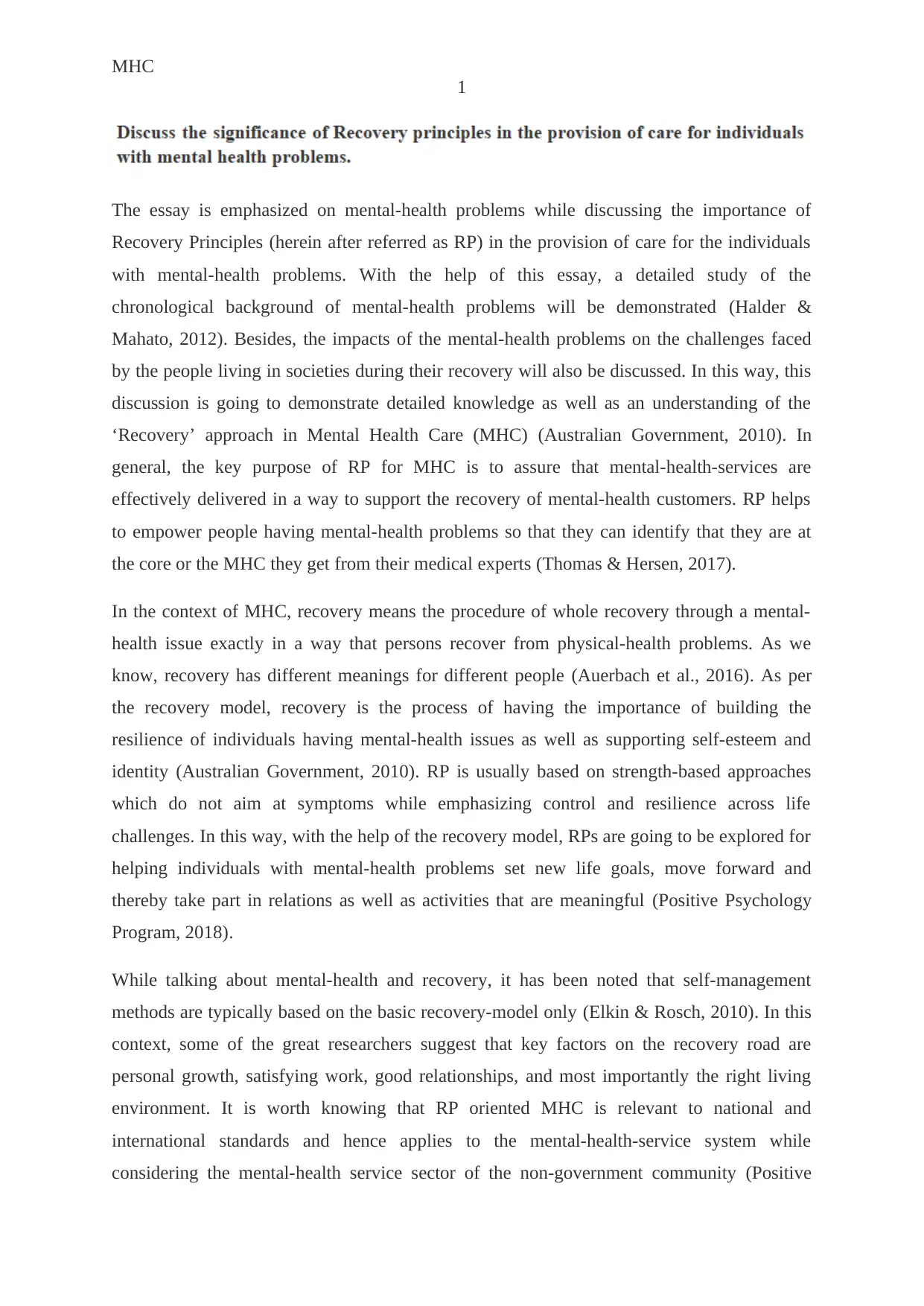
MHC
1
The essay is emphasized on mental-health problems while discussing the importance of
Recovery Principles (herein after referred as RP) in the provision of care for the individuals
with mental-health problems. With the help of this essay, a detailed study of the
chronological background of mental-health problems will be demonstrated (Halder &
Mahato, 2012). Besides, the impacts of the mental-health problems on the challenges faced
by the people living in societies during their recovery will also be discussed. In this way, this
discussion is going to demonstrate detailed knowledge as well as an understanding of the
‘Recovery’ approach in Mental Health Care (MHC) (Australian Government, 2010). In
general, the key purpose of RP for MHC is to assure that mental-health-services are
effectively delivered in a way to support the recovery of mental-health customers. RP helps
to empower people having mental-health problems so that they can identify that they are at
the core or the MHC they get from their medical experts (Thomas & Hersen, 2017).
In the context of MHC, recovery means the procedure of whole recovery through a mental-
health issue exactly in a way that persons recover from physical-health problems. As we
know, recovery has different meanings for different people (Auerbach et al., 2016). As per
the recovery model, recovery is the process of having the importance of building the
resilience of individuals having mental-health issues as well as supporting self-esteem and
identity (Australian Government, 2010). RP is usually based on strength-based approaches
which do not aim at symptoms while emphasizing control and resilience across life
challenges. In this way, with the help of the recovery model, RPs are going to be explored for
helping individuals with mental-health problems set new life goals, move forward and
thereby take part in relations as well as activities that are meaningful (Positive Psychology
Program, 2018).
While talking about mental-health and recovery, it has been noted that self-management
methods are typically based on the basic recovery-model only (Elkin & Rosch, 2010). In this
context, some of the great researchers suggest that key factors on the recovery road are
personal growth, satisfying work, good relationships, and most importantly the right living
environment. It is worth knowing that RP oriented MHC is relevant to national and
international standards and hence applies to the mental-health-service system while
considering the mental-health service sector of the non-government community (Positive
1
The essay is emphasized on mental-health problems while discussing the importance of
Recovery Principles (herein after referred as RP) in the provision of care for the individuals
with mental-health problems. With the help of this essay, a detailed study of the
chronological background of mental-health problems will be demonstrated (Halder &
Mahato, 2012). Besides, the impacts of the mental-health problems on the challenges faced
by the people living in societies during their recovery will also be discussed. In this way, this
discussion is going to demonstrate detailed knowledge as well as an understanding of the
‘Recovery’ approach in Mental Health Care (MHC) (Australian Government, 2010). In
general, the key purpose of RP for MHC is to assure that mental-health-services are
effectively delivered in a way to support the recovery of mental-health customers. RP helps
to empower people having mental-health problems so that they can identify that they are at
the core or the MHC they get from their medical experts (Thomas & Hersen, 2017).
In the context of MHC, recovery means the procedure of whole recovery through a mental-
health issue exactly in a way that persons recover from physical-health problems. As we
know, recovery has different meanings for different people (Auerbach et al., 2016). As per
the recovery model, recovery is the process of having the importance of building the
resilience of individuals having mental-health issues as well as supporting self-esteem and
identity (Australian Government, 2010). RP is usually based on strength-based approaches
which do not aim at symptoms while emphasizing control and resilience across life
challenges. In this way, with the help of the recovery model, RPs are going to be explored for
helping individuals with mental-health problems set new life goals, move forward and
thereby take part in relations as well as activities that are meaningful (Positive Psychology
Program, 2018).
While talking about mental-health and recovery, it has been noted that self-management
methods are typically based on the basic recovery-model only (Elkin & Rosch, 2010). In this
context, some of the great researchers suggest that key factors on the recovery road are
personal growth, satisfying work, good relationships, and most importantly the right living
environment. It is worth knowing that RP oriented MHC is relevant to national and
international standards and hence applies to the mental-health-service system while
considering the mental-health service sector of the non-government community (Positive
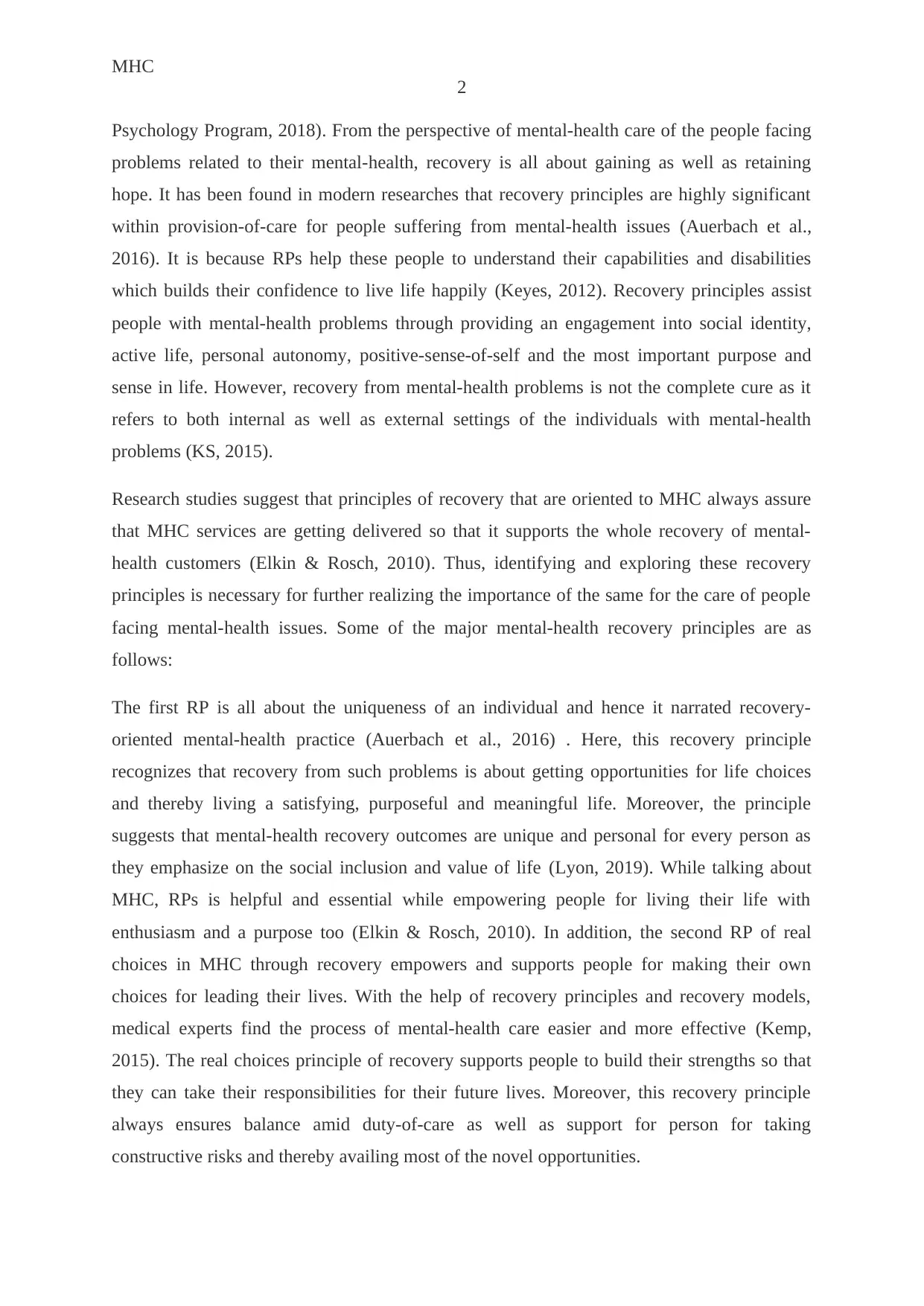
MHC
2
Psychology Program, 2018). From the perspective of mental-health care of the people facing
problems related to their mental-health, recovery is all about gaining as well as retaining
hope. It has been found in modern researches that recovery principles are highly significant
within provision-of-care for people suffering from mental-health issues (Auerbach et al.,
2016). It is because RPs help these people to understand their capabilities and disabilities
which builds their confidence to live life happily (Keyes, 2012). Recovery principles assist
people with mental-health problems through providing an engagement into social identity,
active life, personal autonomy, positive-sense-of-self and the most important purpose and
sense in life. However, recovery from mental-health problems is not the complete cure as it
refers to both internal as well as external settings of the individuals with mental-health
problems (KS, 2015).
Research studies suggest that principles of recovery that are oriented to MHC always assure
that MHC services are getting delivered so that it supports the whole recovery of mental-
health customers (Elkin & Rosch, 2010). Thus, identifying and exploring these recovery
principles is necessary for further realizing the importance of the same for the care of people
facing mental-health issues. Some of the major mental-health recovery principles are as
follows:
The first RP is all about the uniqueness of an individual and hence it narrated recovery-
oriented mental-health practice (Auerbach et al., 2016) . Here, this recovery principle
recognizes that recovery from such problems is about getting opportunities for life choices
and thereby living a satisfying, purposeful and meaningful life. Moreover, the principle
suggests that mental-health recovery outcomes are unique and personal for every person as
they emphasize on the social inclusion and value of life (Lyon, 2019). While talking about
MHC, RPs is helpful and essential while empowering people for living their life with
enthusiasm and a purpose too (Elkin & Rosch, 2010). In addition, the second RP of real
choices in MHC through recovery empowers and supports people for making their own
choices for leading their lives. With the help of recovery principles and recovery models,
medical experts find the process of mental-health care easier and more effective (Kemp,
2015). The real choices principle of recovery supports people to build their strengths so that
they can take their responsibilities for their future lives. Moreover, this recovery principle
always ensures balance amid duty-of-care as well as support for person for taking
constructive risks and thereby availing most of the novel opportunities.
2
Psychology Program, 2018). From the perspective of mental-health care of the people facing
problems related to their mental-health, recovery is all about gaining as well as retaining
hope. It has been found in modern researches that recovery principles are highly significant
within provision-of-care for people suffering from mental-health issues (Auerbach et al.,
2016). It is because RPs help these people to understand their capabilities and disabilities
which builds their confidence to live life happily (Keyes, 2012). Recovery principles assist
people with mental-health problems through providing an engagement into social identity,
active life, personal autonomy, positive-sense-of-self and the most important purpose and
sense in life. However, recovery from mental-health problems is not the complete cure as it
refers to both internal as well as external settings of the individuals with mental-health
problems (KS, 2015).
Research studies suggest that principles of recovery that are oriented to MHC always assure
that MHC services are getting delivered so that it supports the whole recovery of mental-
health customers (Elkin & Rosch, 2010). Thus, identifying and exploring these recovery
principles is necessary for further realizing the importance of the same for the care of people
facing mental-health issues. Some of the major mental-health recovery principles are as
follows:
The first RP is all about the uniqueness of an individual and hence it narrated recovery-
oriented mental-health practice (Auerbach et al., 2016) . Here, this recovery principle
recognizes that recovery from such problems is about getting opportunities for life choices
and thereby living a satisfying, purposeful and meaningful life. Moreover, the principle
suggests that mental-health recovery outcomes are unique and personal for every person as
they emphasize on the social inclusion and value of life (Lyon, 2019). While talking about
MHC, RPs is helpful and essential while empowering people for living their life with
enthusiasm and a purpose too (Elkin & Rosch, 2010). In addition, the second RP of real
choices in MHC through recovery empowers and supports people for making their own
choices for leading their lives. With the help of recovery principles and recovery models,
medical experts find the process of mental-health care easier and more effective (Kemp,
2015). The real choices principle of recovery supports people to build their strengths so that
they can take their responsibilities for their future lives. Moreover, this recovery principle
always ensures balance amid duty-of-care as well as support for person for taking
constructive risks and thereby availing most of the novel opportunities.
⊘ This is a preview!⊘
Do you want full access?
Subscribe today to unlock all pages.

Trusted by 1+ million students worldwide
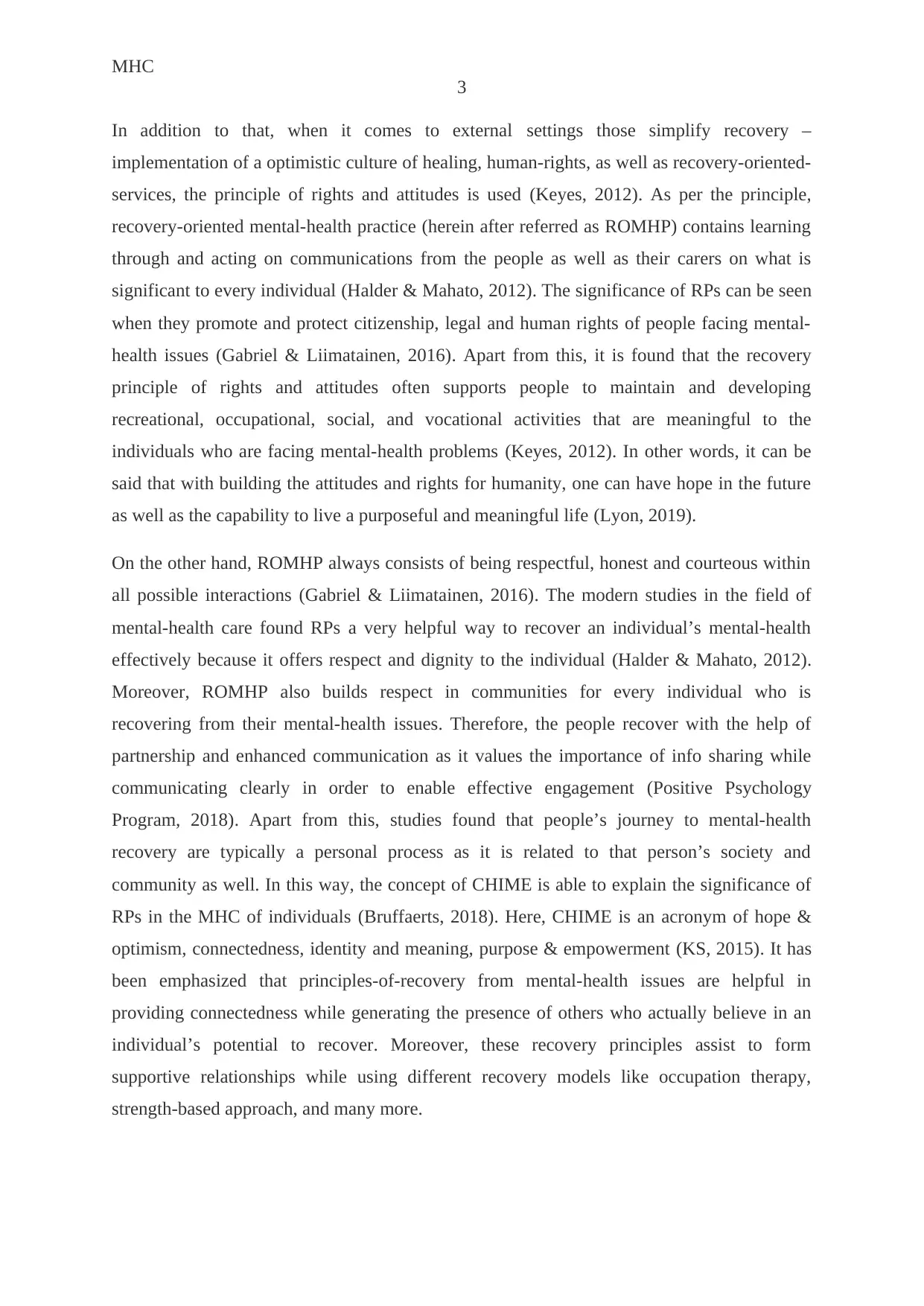
MHC
3
In addition to that, when it comes to external settings those simplify recovery –
implementation of a optimistic culture of healing, human-rights, as well as recovery-oriented-
services, the principle of rights and attitudes is used (Keyes, 2012). As per the principle,
recovery-oriented mental-health practice (herein after referred as ROMHP) contains learning
through and acting on communications from the people as well as their carers on what is
significant to every individual (Halder & Mahato, 2012). The significance of RPs can be seen
when they promote and protect citizenship, legal and human rights of people facing mental-
health issues (Gabriel & Liimatainen, 2016). Apart from this, it is found that the recovery
principle of rights and attitudes often supports people to maintain and developing
recreational, occupational, social, and vocational activities that are meaningful to the
individuals who are facing mental-health problems (Keyes, 2012). In other words, it can be
said that with building the attitudes and rights for humanity, one can have hope in the future
as well as the capability to live a purposeful and meaningful life (Lyon, 2019).
On the other hand, ROMHP always consists of being respectful, honest and courteous within
all possible interactions (Gabriel & Liimatainen, 2016). The modern studies in the field of
mental-health care found RPs a very helpful way to recover an individual’s mental-health
effectively because it offers respect and dignity to the individual (Halder & Mahato, 2012).
Moreover, ROMHP also builds respect in communities for every individual who is
recovering from their mental-health issues. Therefore, the people recover with the help of
partnership and enhanced communication as it values the importance of info sharing while
communicating clearly in order to enable effective engagement (Positive Psychology
Program, 2018). Apart from this, studies found that people’s journey to mental-health
recovery are typically a personal process as it is related to that person’s society and
community as well. In this way, the concept of CHIME is able to explain the significance of
RPs in the MHC of individuals (Bruffaerts, 2018). Here, CHIME is an acronym of hope &
optimism, connectedness, identity and meaning, purpose & empowerment (KS, 2015). It has
been emphasized that principles-of-recovery from mental-health issues are helpful in
providing connectedness while generating the presence of others who actually believe in an
individual’s potential to recover. Moreover, these recovery principles assist to form
supportive relationships while using different recovery models like occupation therapy,
strength-based approach, and many more.
3
In addition to that, when it comes to external settings those simplify recovery –
implementation of a optimistic culture of healing, human-rights, as well as recovery-oriented-
services, the principle of rights and attitudes is used (Keyes, 2012). As per the principle,
recovery-oriented mental-health practice (herein after referred as ROMHP) contains learning
through and acting on communications from the people as well as their carers on what is
significant to every individual (Halder & Mahato, 2012). The significance of RPs can be seen
when they promote and protect citizenship, legal and human rights of people facing mental-
health issues (Gabriel & Liimatainen, 2016). Apart from this, it is found that the recovery
principle of rights and attitudes often supports people to maintain and developing
recreational, occupational, social, and vocational activities that are meaningful to the
individuals who are facing mental-health problems (Keyes, 2012). In other words, it can be
said that with building the attitudes and rights for humanity, one can have hope in the future
as well as the capability to live a purposeful and meaningful life (Lyon, 2019).
On the other hand, ROMHP always consists of being respectful, honest and courteous within
all possible interactions (Gabriel & Liimatainen, 2016). The modern studies in the field of
mental-health care found RPs a very helpful way to recover an individual’s mental-health
effectively because it offers respect and dignity to the individual (Halder & Mahato, 2012).
Moreover, ROMHP also builds respect in communities for every individual who is
recovering from their mental-health issues. Therefore, the people recover with the help of
partnership and enhanced communication as it values the importance of info sharing while
communicating clearly in order to enable effective engagement (Positive Psychology
Program, 2018). Apart from this, studies found that people’s journey to mental-health
recovery are typically a personal process as it is related to that person’s society and
community as well. In this way, the concept of CHIME is able to explain the significance of
RPs in the MHC of individuals (Bruffaerts, 2018). Here, CHIME is an acronym of hope &
optimism, connectedness, identity and meaning, purpose & empowerment (KS, 2015). It has
been emphasized that principles-of-recovery from mental-health issues are helpful in
providing connectedness while generating the presence of others who actually believe in an
individual’s potential to recover. Moreover, these recovery principles assist to form
supportive relationships while using different recovery models like occupation therapy,
strength-based approach, and many more.
Paraphrase This Document
Need a fresh take? Get an instant paraphrase of this document with our AI Paraphraser
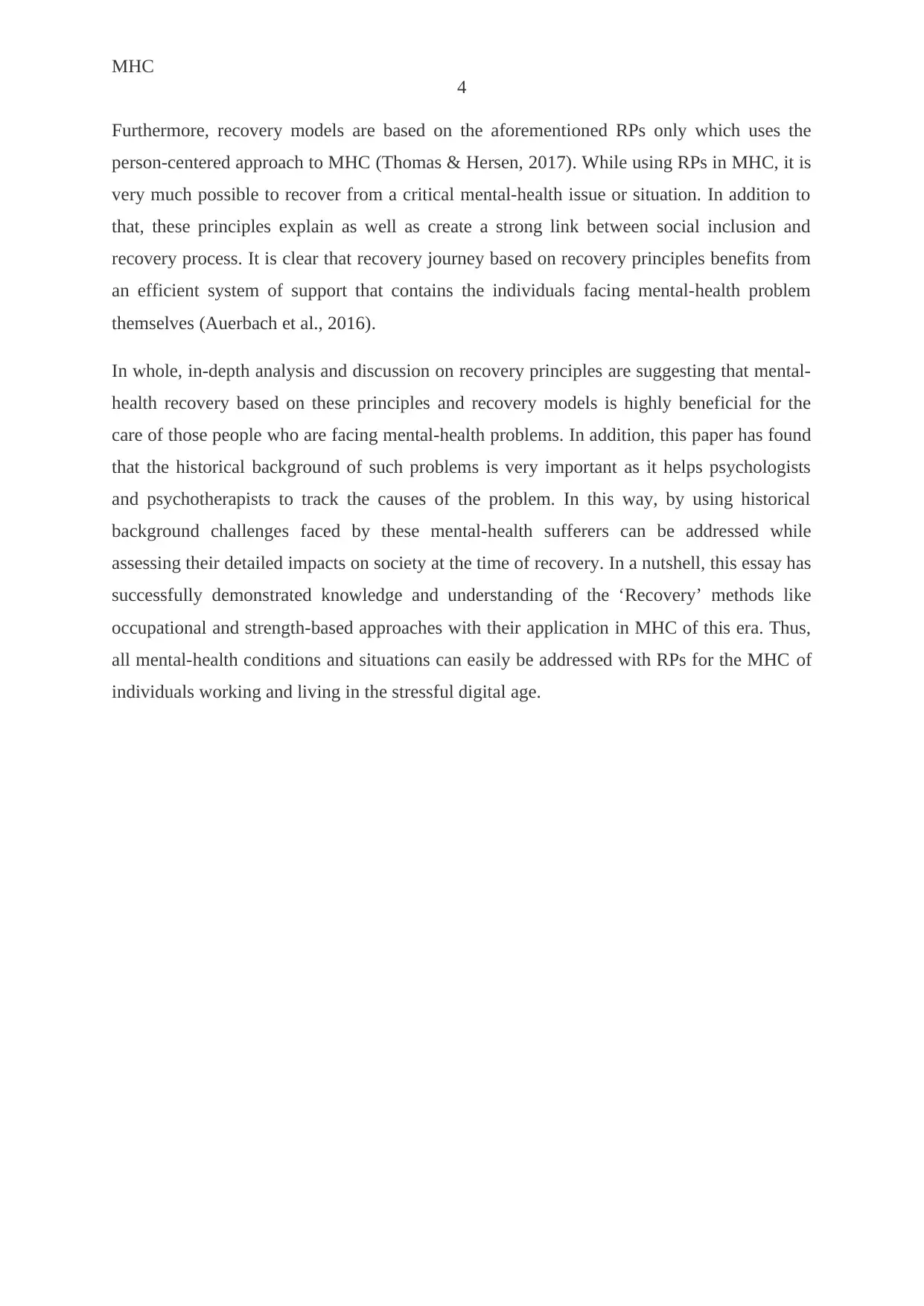
MHC
4
Furthermore, recovery models are based on the aforementioned RPs only which uses the
person-centered approach to MHC (Thomas & Hersen, 2017). While using RPs in MHC, it is
very much possible to recover from a critical mental-health issue or situation. In addition to
that, these principles explain as well as create a strong link between social inclusion and
recovery process. It is clear that recovery journey based on recovery principles benefits from
an efficient system of support that contains the individuals facing mental-health problem
themselves (Auerbach et al., 2016).
In whole, in-depth analysis and discussion on recovery principles are suggesting that mental-
health recovery based on these principles and recovery models is highly beneficial for the
care of those people who are facing mental-health problems. In addition, this paper has found
that the historical background of such problems is very important as it helps psychologists
and psychotherapists to track the causes of the problem. In this way, by using historical
background challenges faced by these mental-health sufferers can be addressed while
assessing their detailed impacts on society at the time of recovery. In a nutshell, this essay has
successfully demonstrated knowledge and understanding of the ‘Recovery’ methods like
occupational and strength-based approaches with their application in MHC of this era. Thus,
all mental-health conditions and situations can easily be addressed with RPs for the MHC of
individuals working and living in the stressful digital age.
4
Furthermore, recovery models are based on the aforementioned RPs only which uses the
person-centered approach to MHC (Thomas & Hersen, 2017). While using RPs in MHC, it is
very much possible to recover from a critical mental-health issue or situation. In addition to
that, these principles explain as well as create a strong link between social inclusion and
recovery process. It is clear that recovery journey based on recovery principles benefits from
an efficient system of support that contains the individuals facing mental-health problem
themselves (Auerbach et al., 2016).
In whole, in-depth analysis and discussion on recovery principles are suggesting that mental-
health recovery based on these principles and recovery models is highly beneficial for the
care of those people who are facing mental-health problems. In addition, this paper has found
that the historical background of such problems is very important as it helps psychologists
and psychotherapists to track the causes of the problem. In this way, by using historical
background challenges faced by these mental-health sufferers can be addressed while
assessing their detailed impacts on society at the time of recovery. In a nutshell, this essay has
successfully demonstrated knowledge and understanding of the ‘Recovery’ methods like
occupational and strength-based approaches with their application in MHC of this era. Thus,
all mental-health conditions and situations can easily be addressed with RPs for the MHC of
individuals working and living in the stressful digital age.
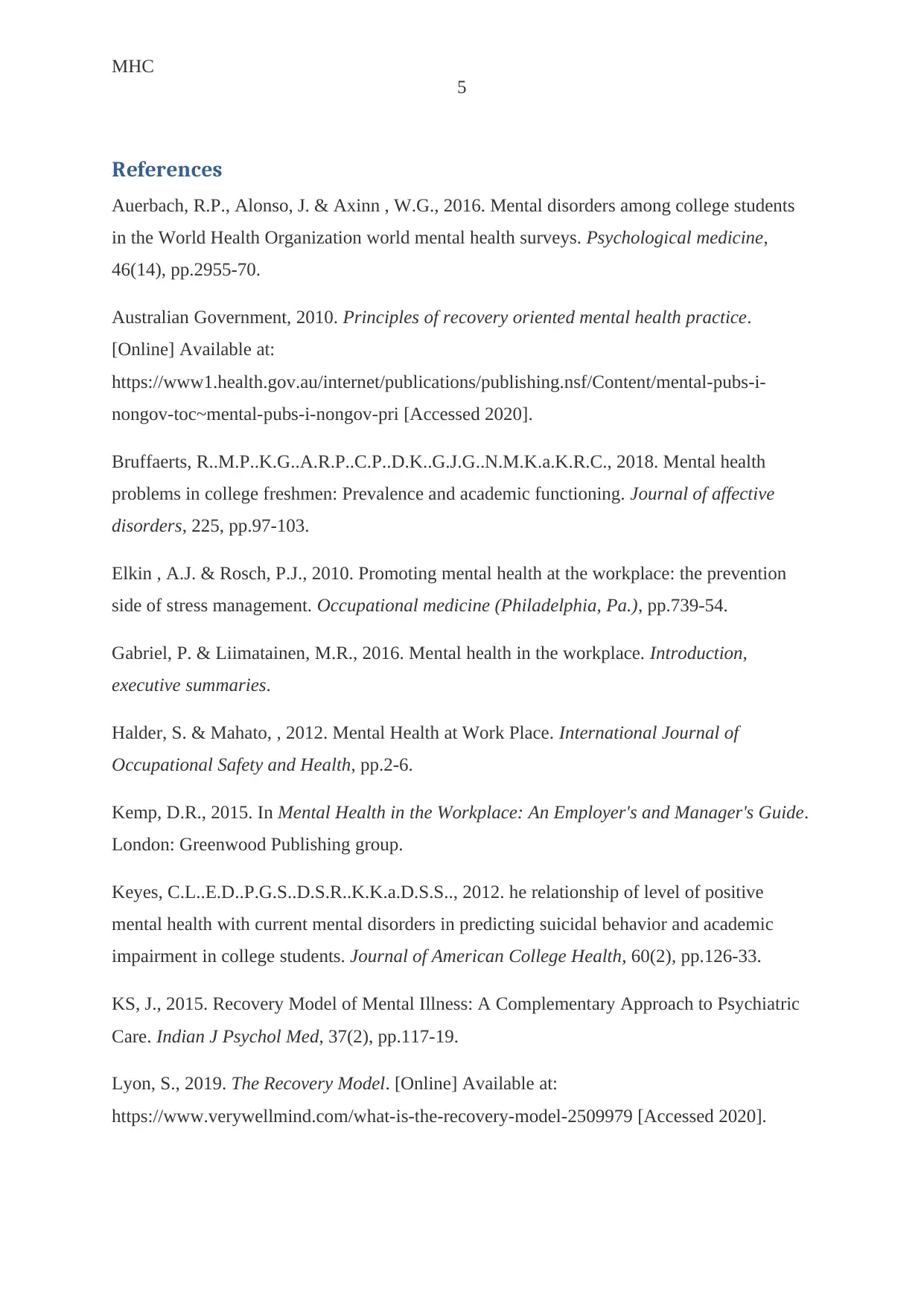
MHC
5
References
Auerbach, R.P., Alonso, J. & Axinn , W.G., 2016. Mental disorders among college students
in the World Health Organization world mental health surveys. Psychological medicine,
46(14), pp.2955-70.
Australian Government, 2010. Principles of recovery oriented mental health practice.
[Online] Available at:
https://www1.health.gov.au/internet/publications/publishing.nsf/Content/mental-pubs-i-
nongov-toc~mental-pubs-i-nongov-pri [Accessed 2020].
Bruffaerts, R..M.P..K.G..A.R.P..C.P..D.K..G.J.G..N.M.K.a.K.R.C., 2018. Mental health
problems in college freshmen: Prevalence and academic functioning. Journal of affective
disorders, 225, pp.97-103.
Elkin , A.J. & Rosch, P.J., 2010. Promoting mental health at the workplace: the prevention
side of stress management. Occupational medicine (Philadelphia, Pa.), pp.739-54.
Gabriel, P. & Liimatainen, M.R., 2016. Mental health in the workplace. Introduction,
executive summaries.
Halder, S. & Mahato, , 2012. Mental Health at Work Place. International Journal of
Occupational Safety and Health, pp.2-6.
Kemp, D.R., 2015. In Mental Health in the Workplace: An Employer's and Manager's Guide.
London: Greenwood Publishing group.
Keyes, C.L..E.D..P.G.S..D.S.R..K.K.a.D.S.S.., 2012. he relationship of level of positive
mental health with current mental disorders in predicting suicidal behavior and academic
impairment in college students. Journal of American College Health, 60(2), pp.126-33.
KS, J., 2015. Recovery Model of Mental Illness: A Complementary Approach to Psychiatric
Care. Indian J Psychol Med, 37(2), pp.117-19.
Lyon, S., 2019. The Recovery Model. [Online] Available at:
https://www.verywellmind.com/what-is-the-recovery-model-2509979 [Accessed 2020].
5
References
Auerbach, R.P., Alonso, J. & Axinn , W.G., 2016. Mental disorders among college students
in the World Health Organization world mental health surveys. Psychological medicine,
46(14), pp.2955-70.
Australian Government, 2010. Principles of recovery oriented mental health practice.
[Online] Available at:
https://www1.health.gov.au/internet/publications/publishing.nsf/Content/mental-pubs-i-
nongov-toc~mental-pubs-i-nongov-pri [Accessed 2020].
Bruffaerts, R..M.P..K.G..A.R.P..C.P..D.K..G.J.G..N.M.K.a.K.R.C., 2018. Mental health
problems in college freshmen: Prevalence and academic functioning. Journal of affective
disorders, 225, pp.97-103.
Elkin , A.J. & Rosch, P.J., 2010. Promoting mental health at the workplace: the prevention
side of stress management. Occupational medicine (Philadelphia, Pa.), pp.739-54.
Gabriel, P. & Liimatainen, M.R., 2016. Mental health in the workplace. Introduction,
executive summaries.
Halder, S. & Mahato, , 2012. Mental Health at Work Place. International Journal of
Occupational Safety and Health, pp.2-6.
Kemp, D.R., 2015. In Mental Health in the Workplace: An Employer's and Manager's Guide.
London: Greenwood Publishing group.
Keyes, C.L..E.D..P.G.S..D.S.R..K.K.a.D.S.S.., 2012. he relationship of level of positive
mental health with current mental disorders in predicting suicidal behavior and academic
impairment in college students. Journal of American College Health, 60(2), pp.126-33.
KS, J., 2015. Recovery Model of Mental Illness: A Complementary Approach to Psychiatric
Care. Indian J Psychol Med, 37(2), pp.117-19.
Lyon, S., 2019. The Recovery Model. [Online] Available at:
https://www.verywellmind.com/what-is-the-recovery-model-2509979 [Accessed 2020].
⊘ This is a preview!⊘
Do you want full access?
Subscribe today to unlock all pages.

Trusted by 1+ million students worldwide
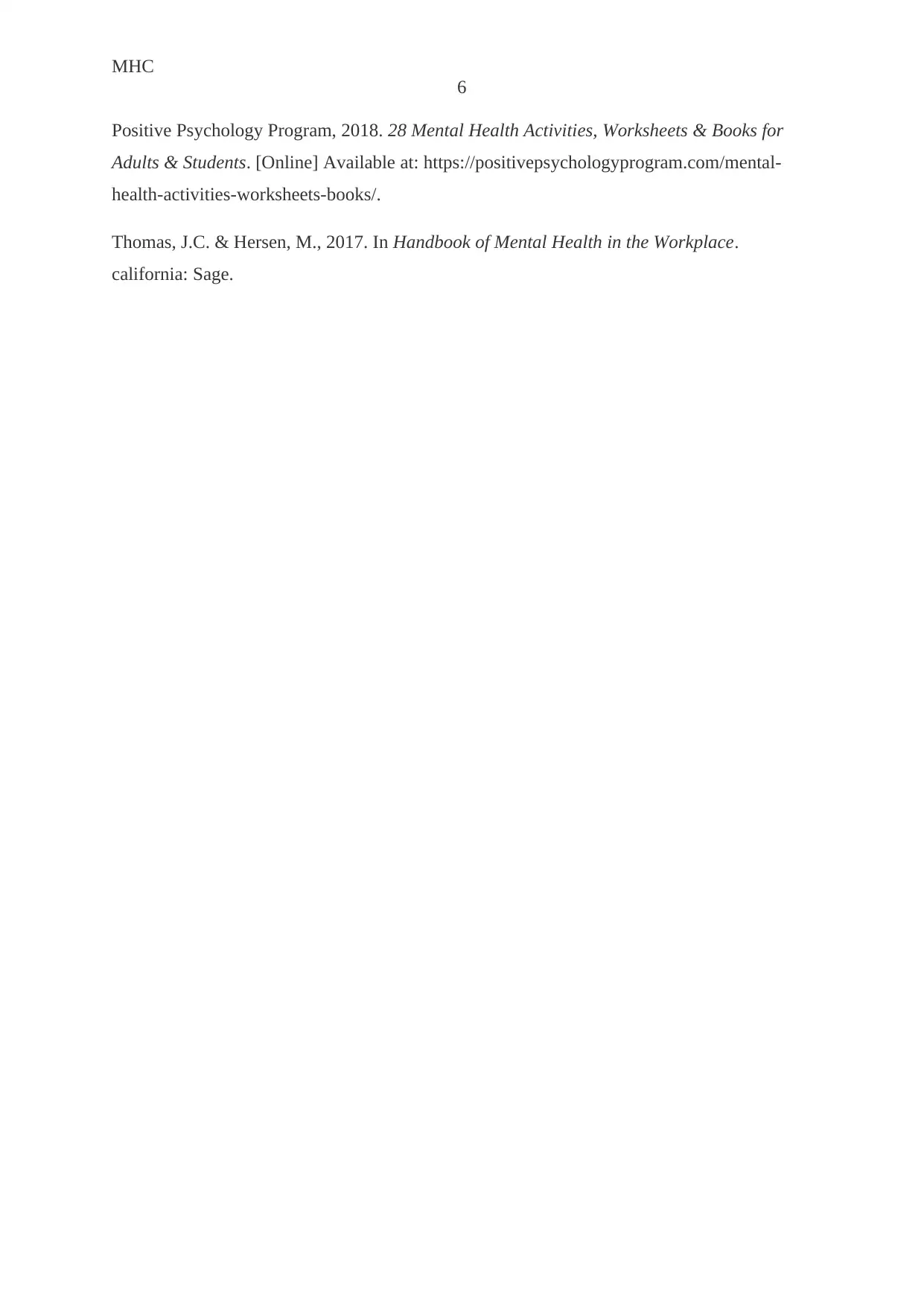
MHC
6
Positive Psychology Program, 2018. 28 Mental Health Activities, Worksheets & Books for
Adults & Students. [Online] Available at: https://positivepsychologyprogram.com/mental-
health-activities-worksheets-books/.
Thomas, J.C. & Hersen, M., 2017. In Handbook of Mental Health in the Workplace.
california: Sage.
6
Positive Psychology Program, 2018. 28 Mental Health Activities, Worksheets & Books for
Adults & Students. [Online] Available at: https://positivepsychologyprogram.com/mental-
health-activities-worksheets-books/.
Thomas, J.C. & Hersen, M., 2017. In Handbook of Mental Health in the Workplace.
california: Sage.
Paraphrase This Document
Need a fresh take? Get an instant paraphrase of this document with our AI Paraphraser

MHC
7
7
1 out of 8
Related Documents
Your All-in-One AI-Powered Toolkit for Academic Success.
+13062052269
info@desklib.com
Available 24*7 on WhatsApp / Email
![[object Object]](/_next/static/media/star-bottom.7253800d.svg)
Unlock your academic potential
Copyright © 2020–2026 A2Z Services. All Rights Reserved. Developed and managed by ZUCOL.





